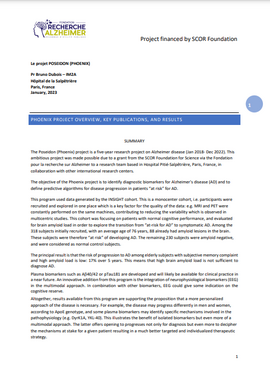POSEIDON Project Final Report
The Poseidon (Phoenix) project is a five-year research project on Alzheimer disease that started in 2018 and ended at end the of 2022. The main research conclusions are included in the final report.

This ambitious project was made possible due to a grant from the SCOR Foundation for Science via the Fondation pour la recherche sur Alzheimer to a research team based in Hospital Pitié-Salpêtrière, Paris, France, in collaboration with other international research centers.
The objective of the Phoenix project is to identify diagnostic biomarkers for Alzheimer's disease (AD) and to define predictive algorithms for disease progression in patients “at risk” for AD.
This program used data generated by the INSIGHT cohort. This is a monocenter cohort, participants were recruited and explored in one place which is a key factor for the quality of the data: e.g. MRI (magnetic resonance imaging) and PET (Positron emission tomography) were constantly performed on the same machines, contributing to reducing the variability which is observed in multicentric studies. This cohort was focusing on patients with normal cognitive performance, and evaluated for brain amyloid load in order to explore the transition from “at-risk for AD” to symptomatic AD. Among the 318 subjects initially recruited, with an average age of 76 years, 88 already had amyloid lesions in the brain. These subjects were therefore “at risk” of developing AD. The remaining 230 subjects were amyloid negative, and were considered as normal control subjects.
The principal result is that the risk of progression to AD among elderly subjects with subjective memory complaint and high amyloid load is low: 17% over 5 years. This means that high brain amyloid load is not sufficient to diagnose AD.
Plasma biomarkers such as A40/42 or pTau181 are developed and will likely be available for clinical practice in a near future. An innovative addition from this program is the integration of neurophysiological biomarkers (EEG) in the multimodal approach. In combination with other biomarkers, EEG could give some indication on the cognitive reserve.
Altogether, results available from this program are supporting the proposition that a more personalized approach of the disease is necessary. For example, the disease may progress differently in men and women, according to ApoE genotype, and some plasma biomarkers may identify specific mechanisms involved in the pathophysiology (e.g. DyrK1A, YKL-40). This illustrates the benefit of isolated biomarkers but even more of a multimodal approach. The latter offers opening to progresses not only for diagnosis but even more to decipher the mechanisms at stake for a given patient resulting in a much better targeted and individualized therapeutic strategy.
